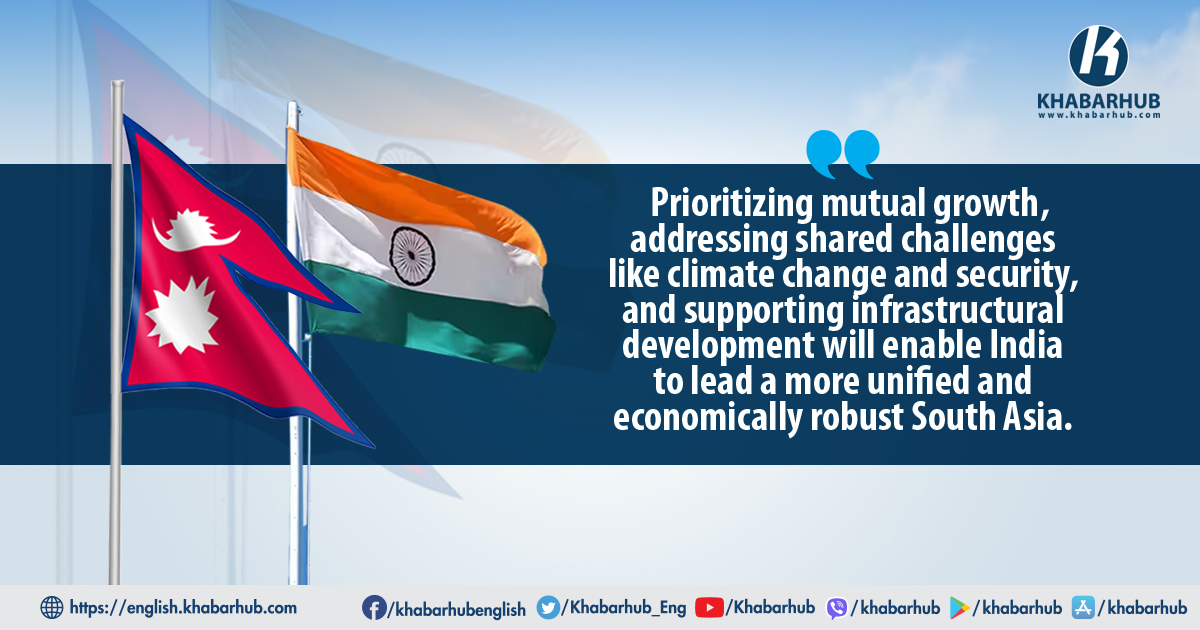Kathmandu and New Delhi must leverage their political will to expand cooperation and ensure both countries benefit from closer ties.
To achieve shared goals of peace, stability, mutual cooperation, and prosperity, both nations need to take equal steps and initiatives that strengthen their strategic partnership in the South Asian region and beyond.
Historical Ties and Recent Developments: Kathmandu and Delhi share deep-rooted historical, cultural, and political connections.
The recent visit of Nepal’s Foreign Minister, Dr. Arzu Rana Deuba, to New Delhi marks the beginning of renewed diplomatic engagement.
Her discussions with Indian leaders highlighted India’s positive reception of Nepal’s new government and reaffirmed a commitment to strengthening bilateral relations.
On the comprehensive strategic partnership, there is a need to broaden the strategic partnership to include the promotion and protection of human rights, freedom of religion or belief, and support for marginalized and vulnerable groups.
Additionally, coordinated efforts should address global challenges such as climate change, human trafficking, and transnational crimes.
It is imperative that Kathmandu and New Delhi continue to engage constructively, leveraging their historical ties and shared aspirations to build a sustainable, well-governed Nepal and a robust partnership that contributes to regional peace and development.
In terms of addressing trade deficit and inflation, Kathmandu aims to engage in dialogue with New Delhi to find long-term solutions to increasing trade deficits, inflation, and unemployment in Nepal. Increasing foreign direct investments (FDIs) could play a crucial role in boosting Nepal’s economy.
Nepal and India can collaborate on cross-border infrastructure projects, such as the petroleum pipeline, rail/road connectivity, and the development of check posts. These initiatives would facilitate smoother trade and economic exchanges, enhancing regional integration.
Meanwhile, resolving issues related to the traditional Gorkha recruitment into the Indian Army is urgent.
A breakthrough in this area could revive a 200-year-old tradition and strengthen trust and people-to-people ties.
Historically, 90% of Gorkha soldiers were from Nepal, but this ratio has shifted to 60% Nepali and 40% Indian. The recent reduction in recruitment due to the Agnipath scheme has led to concerns about the future of Nepali Gorkhas in the Indian Army.
Nepal’s significant hydropower potential and India’s resources and market demand create an opportunity for enhanced cooperation in the energy sector. This includes cross-border electricity transmission lines and renewable energy projects.
Developing physical and digital infrastructure can enhance connectivity between Nepal and India. This includes improving rail and road networks, digital corridors, and cross-border payment systems, which will further integrate their economies and enhance people-to-people exchanges.
Political Stability and Governance
Nepal’s new government, with a two-thirds majority, presents an opportunity to strengthen democratic institutions and governance frameworks. Political stability in Nepal can create a conducive environment for economic growth and development.
India’s “Neighbourhood First” policy and various development cooperation initiatives play a significant role in supporting Nepal’s stability and development. Continued diplomatic support, investment in infrastructure, and capacity-building initiatives are vital.
Both nations share rich cultural ties that can be further enhanced through cultural exchange programs, educational collaborations, and tourism. These initiatives can foster mutual understanding and goodwill.
Affirmative Action and Diversity: Promoting diversity and inclusivity within bilateral relations can strengthen ties at a grassroots level. Programs supporting marginalized communities and promoting shared cultural heritage will help build resilient ties.
While there are contentious issues, such as border disputes and water-sharing agreements, both countries should focus on dialogue and negotiation to resolve these matters amicably. Maintaining open channels of communication is crucial to prevent misunderstandings and foster cooperation.
In an era marked by neopopulism, both Kathmandu and Delhi must adapt to new political realities and leverage populist sentiments to enhance bilateral relations.
Nepal and India stand at a crucial juncture in their bilateral relationship. By focusing on shared interests, addressing economic and political challenges, and fostering people-to-people ties, both nations can work towards a future of mutual prosperity and regional stability.
Such efforts will not only bolster India’s ambition to become the world’s third-largest economy but also ensure sustainable and inclusive development across the region, making SAARC a notable economic force on the global stage.
It is imperative that Kathmandu and New Delhi continue to engage constructively, leveraging their historical ties and shared aspirations to build a sustainable, well-governed Nepal and a robust partnership that contributes to regional peace and development.
India, as a burgeoning economy and the world’s largest democracy, must strategically leverage its “Neighbourhood First” policy to forge stronger economic and diplomatic ties with South Asian neighbors.
By fostering regional cooperation, promoting trade integration, and enhancing connectivity, India can create a cohesive economic bloc that advances the South Asian Association for Regional Cooperation (SAARC) agenda.
Prioritizing mutual growth, addressing shared challenges like climate change and security, and supporting infrastructural development will enable India to lead a more unified and economically robust South Asia.
Such efforts will not only bolster India’s ambition to become the world’s third-largest economy but also ensure sustainable and inclusive development across the region, making SAARC a notable economic force on the global stage.
(Public policy scholars like G.C. also excel in the art of diplomacy.)









Comment